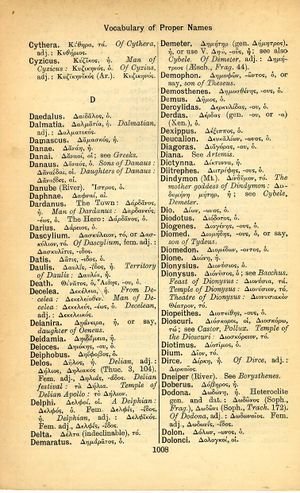Diagoras: Difference between revisions
m (Text replacement - "}}]]" to "}}]]") |
m (Text replacement - "(|thumb)\n(\|link=)" to "$1$2") |
||
| Line 1: | Line 1: | ||
{{WoodhouseENELnames | {{WoodhouseENELnames | ||
|Text=[[File:woodhouse_1008.jpg|thumb | |Text=[[File:woodhouse_1008.jpg|thumb|link={{filepath:woodhouse_1008.jpg}}]]Διαγόρας, -ου, ὁ. | ||
|link={{filepath:woodhouse_1008.jpg}}]]Διαγόρας, -ου, ὁ. | |||
}} | }} | ||
{{Lewis | {{Lewis | ||
Revision as of 16:50, 18 May 2020
English > Greek (Woodhouse)
Διαγόρας, -ου, ὁ.
Latin > English (Lewis & Short)
Dĭăgŏras: ae, m., Διαγόρας.
I An atheistic philosopher and poet of Melos, a contemporary of Pindar, Cic. N. D. 1, 1; 1, 23; 42; 3, 37; Val. Max. 1, 2.—
II One of the most famous athletes in the Olympic games, a native of Rhodes, Cic. Tusc. 1, 46, 111; Gell. 3, 15, 3.
Latin > French (Gaffiot 2016)
Dĭăgŏrās, æ, m. (Διαγόρας),
1 philosophe de Mélos : Cic. Nat. 1, 2
2 Rhodien, qui mourut de joie en voyant ses deux fils couronnés le même jour à Olympie : Cic. Tusc. 1, 111
3 nom d’un médecin : Plin. 1, 12.
Latin > German (Georges)
Diagorās, ae, m. (Διαγόρας), I) ein Dichter u. Philosoph aus Melos (Melius), mit dem Beinamen Ἄθεος Zeitgenosse des Pindar u. Simonides, Cic. de nat. deor. 1, 2. Lact. 1, 2, 2. Min. Fel. 8, 2. – II) ein berühmter Athlet aus Rhodus, Zeitgenosse des Pindar, in dessen Gegenwart zwei seiner Söhne als Hieroniken zu Olympia gekrönt wurden, Cic. Tusc. 1, 111. Gell. 3, 15, 3.

